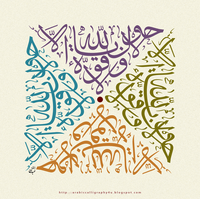Hawqala


The Ḥawqala (Arabic: حَوْقَلَة) or the La Hawla (Arabic: لَا حَوْلَ) is an Arabic term referring to the Arabic statement لَا حَوْلَ وَلَا قُوَّةَ إِلَّا بِٱللَّٰهِ (lā ḥawla wa-lā quwwata ʾillā bi-llāhi) which is usually translated as "There is no power nor strength except by God."
This expression is mentioned by a Muslim when seized by a calamity or in a situation beyond their control, usually when being oppressed or forcefully put through suffering. The word Ḥawqala is a portmanteau (or naḥt) of the words ḥawla and quwwata.[1]
A longer version is لَا حَوْلَ وَلَا قُوَّةَ إِلَّا بِٱللَّٰهِ ٱلْعَلِيِّ ٱلْعَظِيمِ (lā ḥawla wa-lā quwwata ʾillā bi-llāhi l-ʿaliyyi l-ʿaẓīmi), meaning "None has the right to be worshipped except Allah there is no power nor strength or movement except by Allah the Lofty, the Great".
See also[]
References[]
- ^ Piamenta, Moshe (1979). Islam in Everyday Arabic Speech. BRILL. p. 155. ISBN 90-04-05967-9.
- Arabic words and phrases